Report on VW's Deceptive 'Clean Diesel' Campaign and its Implications
VerifiedAdded on 2020/04/21
|7
|1403
|53
Report
AI Summary
This report examines Volkswagen's (VW) 'clean diesel' campaign from 2008 to 2015, focusing on the company's deceptive practices related to vehicle emissions. VW installed software to manipulate emission tests, falsely advertising low pollution levels. The report details how VW used social media in its marketing, targeting environmentally conscious consumers with claims of low emissions and high resale value. It highlights the unfair competition resulting from VW's unethical actions, including the use of 'defeat devices' and misleading advertising, which violated federal emission standards and consumer rights. The analysis covers the legal and ethical concerns surrounding VW's actions, including deceptive advertising and the violation of consumer protection laws, and references the impact on consumer trust and the automotive industry.

Report
Paraphrase This Document
Need a fresh take? Get an instant paraphrase of this document with our AI Paraphraser
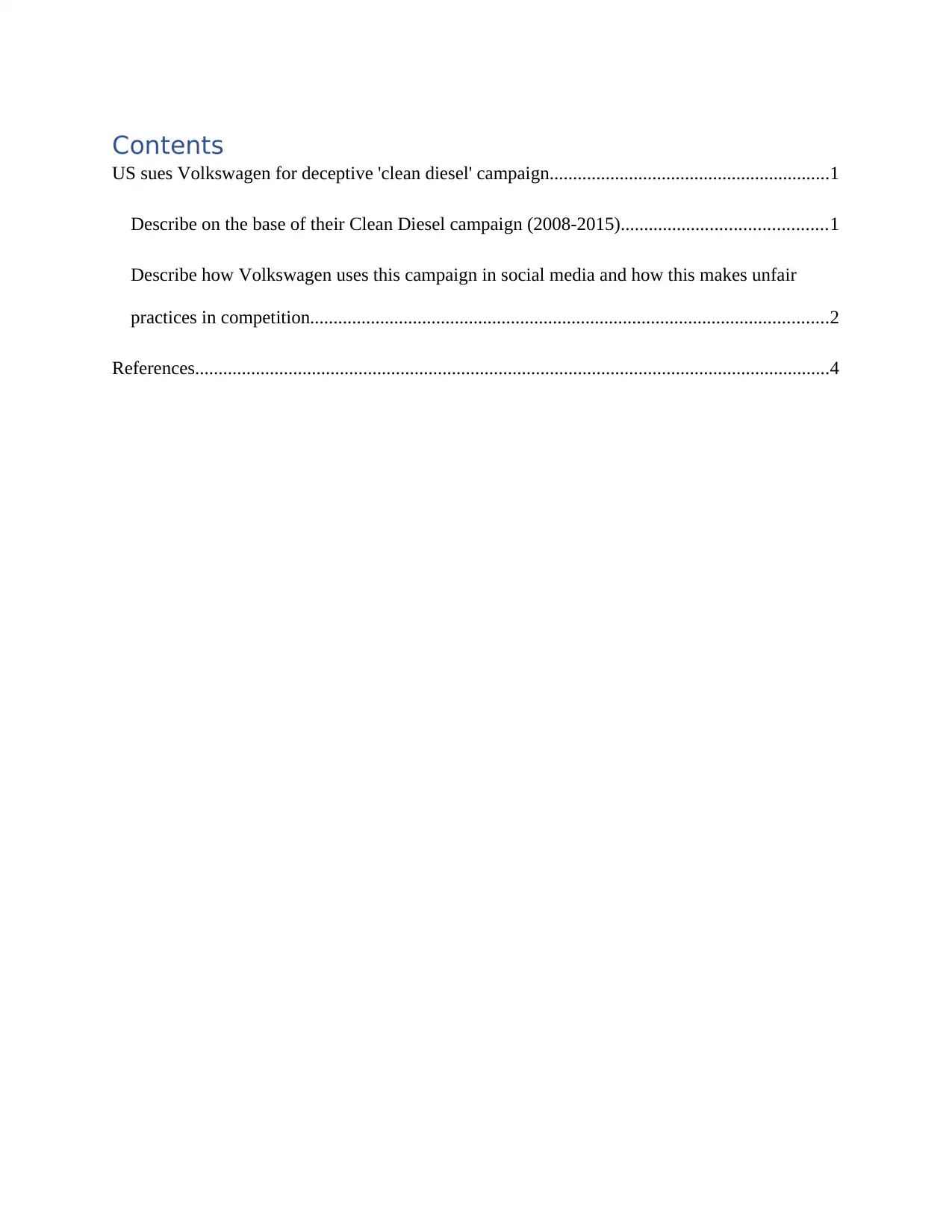
Contents
US sues Volkswagen for deceptive 'clean diesel' campaign............................................................1
Describe on the base of their Clean Diesel campaign (2008-2015)............................................1
Describe how Volkswagen uses this campaign in social media and how this makes unfair
practices in competition...............................................................................................................2
References........................................................................................................................................4
US sues Volkswagen for deceptive 'clean diesel' campaign............................................................1
Describe on the base of their Clean Diesel campaign (2008-2015)............................................1
Describe how Volkswagen uses this campaign in social media and how this makes unfair
practices in competition...............................................................................................................2
References........................................................................................................................................4
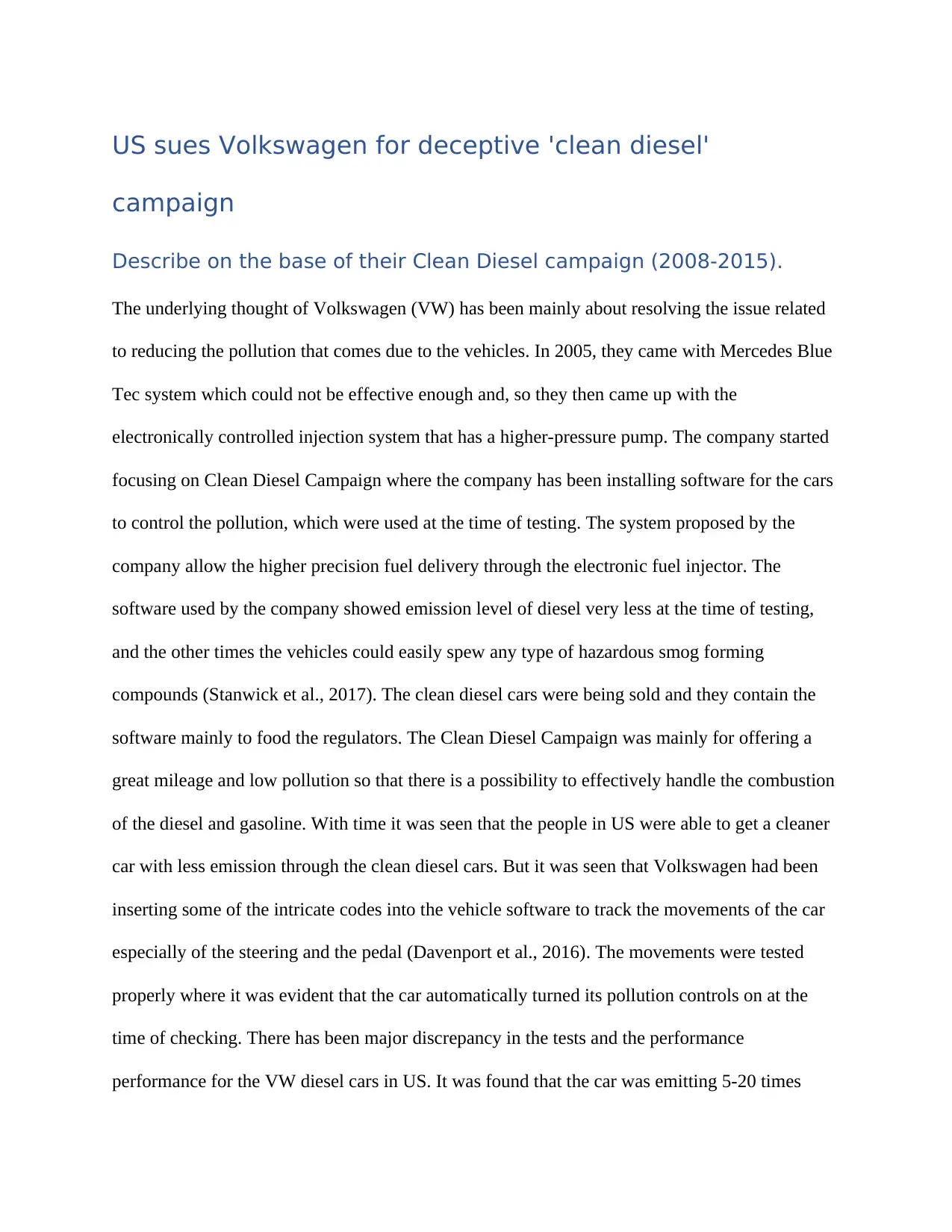
US sues Volkswagen for deceptive 'clean diesel'
campaign
Describe on the base of their Clean Diesel campaign (2008-2015).
The underlying thought of Volkswagen (VW) has been mainly about resolving the issue related
to reducing the pollution that comes due to the vehicles. In 2005, they came with Mercedes Blue
Tec system which could not be effective enough and, so they then came up with the
electronically controlled injection system that has a higher-pressure pump. The company started
focusing on Clean Diesel Campaign where the company has been installing software for the cars
to control the pollution, which were used at the time of testing. The system proposed by the
company allow the higher precision fuel delivery through the electronic fuel injector. The
software used by the company showed emission level of diesel very less at the time of testing,
and the other times the vehicles could easily spew any type of hazardous smog forming
compounds (Stanwick et al., 2017). The clean diesel cars were being sold and they contain the
software mainly to food the regulators. The Clean Diesel Campaign was mainly for offering a
great mileage and low pollution so that there is a possibility to effectively handle the combustion
of the diesel and gasoline. With time it was seen that the people in US were able to get a cleaner
car with less emission through the clean diesel cars. But it was seen that Volkswagen had been
inserting some of the intricate codes into the vehicle software to track the movements of the car
especially of the steering and the pedal (Davenport et al., 2016). The movements were tested
properly where it was evident that the car automatically turned its pollution controls on at the
time of checking. There has been major discrepancy in the tests and the performance
performance for the VW diesel cars in US. It was found that the car was emitting 5-20 times
campaign
Describe on the base of their Clean Diesel campaign (2008-2015).
The underlying thought of Volkswagen (VW) has been mainly about resolving the issue related
to reducing the pollution that comes due to the vehicles. In 2005, they came with Mercedes Blue
Tec system which could not be effective enough and, so they then came up with the
electronically controlled injection system that has a higher-pressure pump. The company started
focusing on Clean Diesel Campaign where the company has been installing software for the cars
to control the pollution, which were used at the time of testing. The system proposed by the
company allow the higher precision fuel delivery through the electronic fuel injector. The
software used by the company showed emission level of diesel very less at the time of testing,
and the other times the vehicles could easily spew any type of hazardous smog forming
compounds (Stanwick et al., 2017). The clean diesel cars were being sold and they contain the
software mainly to food the regulators. The Clean Diesel Campaign was mainly for offering a
great mileage and low pollution so that there is a possibility to effectively handle the combustion
of the diesel and gasoline. With time it was seen that the people in US were able to get a cleaner
car with less emission through the clean diesel cars. But it was seen that Volkswagen had been
inserting some of the intricate codes into the vehicle software to track the movements of the car
especially of the steering and the pedal (Davenport et al., 2016). The movements were tested
properly where it was evident that the car automatically turned its pollution controls on at the
time of checking. There has been major discrepancy in the tests and the performance
performance for the VW diesel cars in US. It was found that the car was emitting 5-20 times
⊘ This is a preview!⊘
Do you want full access?
Subscribe today to unlock all pages.

Trusted by 1+ million students worldwide
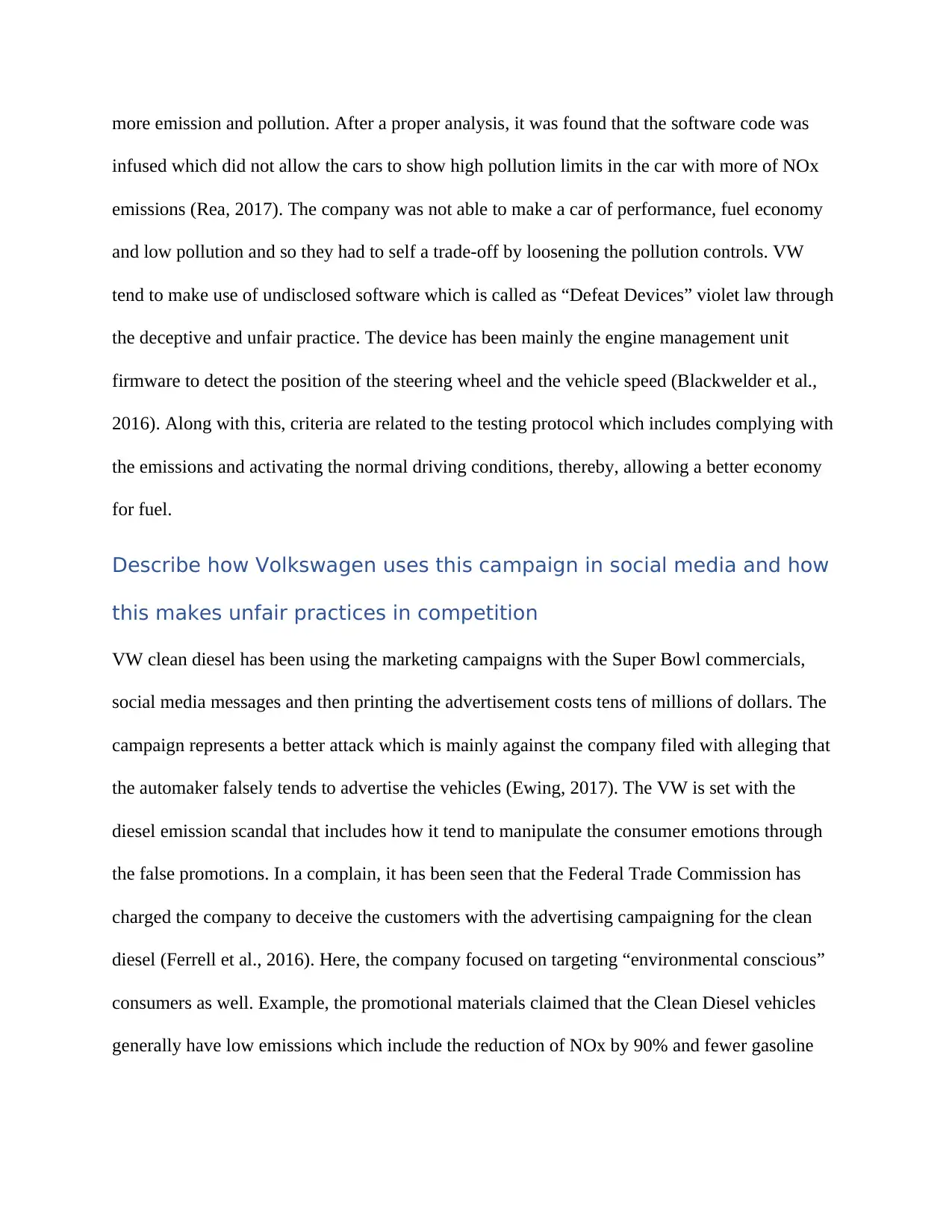
more emission and pollution. After a proper analysis, it was found that the software code was
infused which did not allow the cars to show high pollution limits in the car with more of NOx
emissions (Rea, 2017). The company was not able to make a car of performance, fuel economy
and low pollution and so they had to self a trade-off by loosening the pollution controls. VW
tend to make use of undisclosed software which is called as “Defeat Devices” violet law through
the deceptive and unfair practice. The device has been mainly the engine management unit
firmware to detect the position of the steering wheel and the vehicle speed (Blackwelder et al.,
2016). Along with this, criteria are related to the testing protocol which includes complying with
the emissions and activating the normal driving conditions, thereby, allowing a better economy
for fuel.
Describe how Volkswagen uses this campaign in social media and how
this makes unfair practices in competition
VW clean diesel has been using the marketing campaigns with the Super Bowl commercials,
social media messages and then printing the advertisement costs tens of millions of dollars. The
campaign represents a better attack which is mainly against the company filed with alleging that
the automaker falsely tends to advertise the vehicles (Ewing, 2017). The VW is set with the
diesel emission scandal that includes how it tend to manipulate the consumer emotions through
the false promotions. In a complain, it has been seen that the Federal Trade Commission has
charged the company to deceive the customers with the advertising campaigning for the clean
diesel (Ferrell et al., 2016). Here, the company focused on targeting “environmental conscious”
consumers as well. Example, the promotional materials claimed that the Clean Diesel vehicles
generally have low emissions which include the reduction of NOx by 90% and fewer gasoline
infused which did not allow the cars to show high pollution limits in the car with more of NOx
emissions (Rea, 2017). The company was not able to make a car of performance, fuel economy
and low pollution and so they had to self a trade-off by loosening the pollution controls. VW
tend to make use of undisclosed software which is called as “Defeat Devices” violet law through
the deceptive and unfair practice. The device has been mainly the engine management unit
firmware to detect the position of the steering wheel and the vehicle speed (Blackwelder et al.,
2016). Along with this, criteria are related to the testing protocol which includes complying with
the emissions and activating the normal driving conditions, thereby, allowing a better economy
for fuel.
Describe how Volkswagen uses this campaign in social media and how
this makes unfair practices in competition
VW clean diesel has been using the marketing campaigns with the Super Bowl commercials,
social media messages and then printing the advertisement costs tens of millions of dollars. The
campaign represents a better attack which is mainly against the company filed with alleging that
the automaker falsely tends to advertise the vehicles (Ewing, 2017). The VW is set with the
diesel emission scandal that includes how it tend to manipulate the consumer emotions through
the false promotions. In a complain, it has been seen that the Federal Trade Commission has
charged the company to deceive the customers with the advertising campaigning for the clean
diesel (Ferrell et al., 2016). Here, the company focused on targeting “environmental conscious”
consumers as well. Example, the promotional materials claimed that the Clean Diesel vehicles
generally have low emissions which include the reduction of NOx by 90% and fewer gasoline
Paraphrase This Document
Need a fresh take? Get an instant paraphrase of this document with our AI Paraphraser
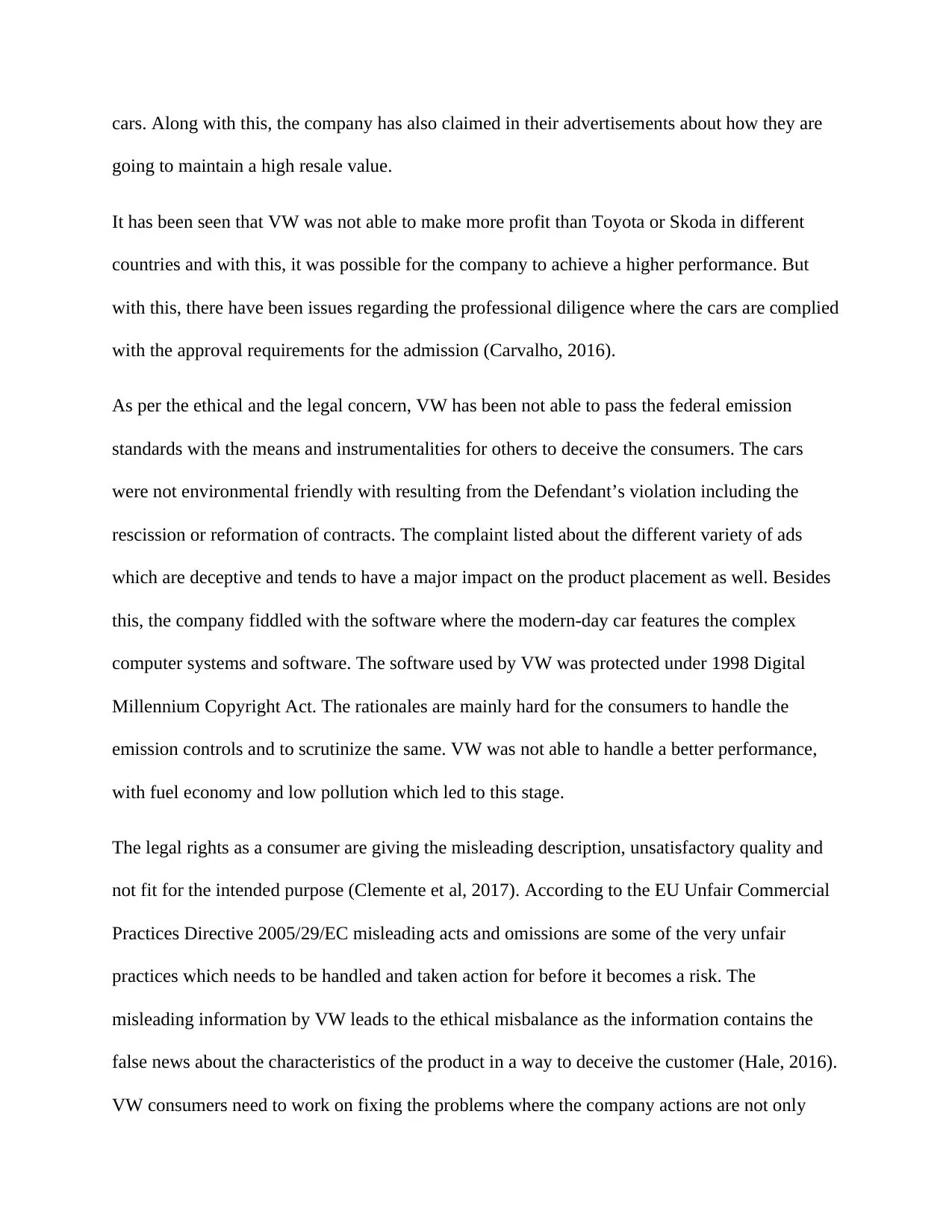
cars. Along with this, the company has also claimed in their advertisements about how they are
going to maintain a high resale value.
It has been seen that VW was not able to make more profit than Toyota or Skoda in different
countries and with this, it was possible for the company to achieve a higher performance. But
with this, there have been issues regarding the professional diligence where the cars are complied
with the approval requirements for the admission (Carvalho, 2016).
As per the ethical and the legal concern, VW has been not able to pass the federal emission
standards with the means and instrumentalities for others to deceive the consumers. The cars
were not environmental friendly with resulting from the Defendant’s violation including the
rescission or reformation of contracts. The complaint listed about the different variety of ads
which are deceptive and tends to have a major impact on the product placement as well. Besides
this, the company fiddled with the software where the modern-day car features the complex
computer systems and software. The software used by VW was protected under 1998 Digital
Millennium Copyright Act. The rationales are mainly hard for the consumers to handle the
emission controls and to scrutinize the same. VW was not able to handle a better performance,
with fuel economy and low pollution which led to this stage.
The legal rights as a consumer are giving the misleading description, unsatisfactory quality and
not fit for the intended purpose (Clemente et al, 2017). According to the EU Unfair Commercial
Practices Directive 2005/29/EC misleading acts and omissions are some of the very unfair
practices which needs to be handled and taken action for before it becomes a risk. The
misleading information by VW leads to the ethical misbalance as the information contains the
false news about the characteristics of the product in a way to deceive the customer (Hale, 2016).
VW consumers need to work on fixing the problems where the company actions are not only
going to maintain a high resale value.
It has been seen that VW was not able to make more profit than Toyota or Skoda in different
countries and with this, it was possible for the company to achieve a higher performance. But
with this, there have been issues regarding the professional diligence where the cars are complied
with the approval requirements for the admission (Carvalho, 2016).
As per the ethical and the legal concern, VW has been not able to pass the federal emission
standards with the means and instrumentalities for others to deceive the consumers. The cars
were not environmental friendly with resulting from the Defendant’s violation including the
rescission or reformation of contracts. The complaint listed about the different variety of ads
which are deceptive and tends to have a major impact on the product placement as well. Besides
this, the company fiddled with the software where the modern-day car features the complex
computer systems and software. The software used by VW was protected under 1998 Digital
Millennium Copyright Act. The rationales are mainly hard for the consumers to handle the
emission controls and to scrutinize the same. VW was not able to handle a better performance,
with fuel economy and low pollution which led to this stage.
The legal rights as a consumer are giving the misleading description, unsatisfactory quality and
not fit for the intended purpose (Clemente et al, 2017). According to the EU Unfair Commercial
Practices Directive 2005/29/EC misleading acts and omissions are some of the very unfair
practices which needs to be handled and taken action for before it becomes a risk. The
misleading information by VW leads to the ethical misbalance as the information contains the
false news about the characteristics of the product in a way to deceive the customer (Hale, 2016).
VW consumers need to work on fixing the problems where the company actions are not only
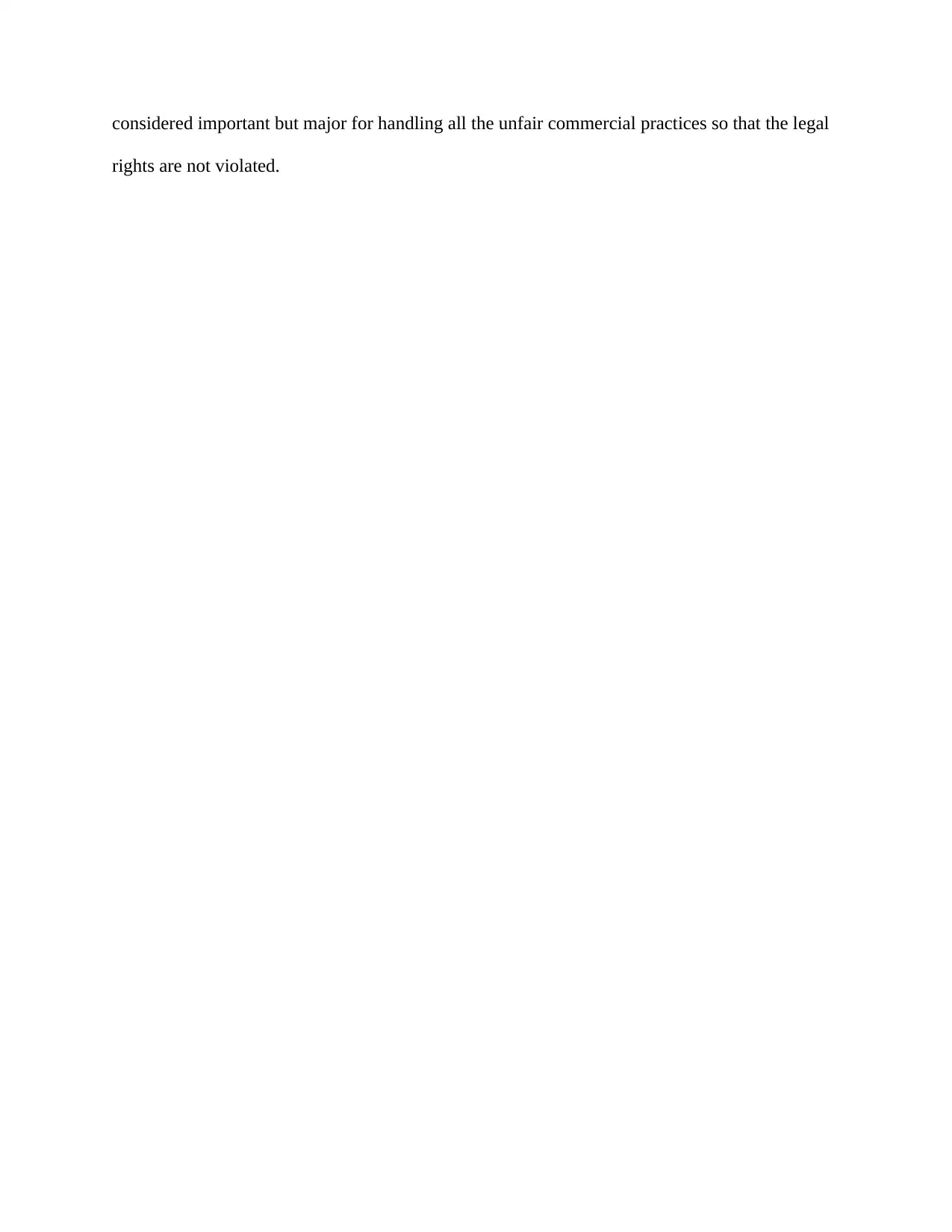
considered important but major for handling all the unfair commercial practices so that the legal
rights are not violated.
rights are not violated.
⊘ This is a preview!⊘
Do you want full access?
Subscribe today to unlock all pages.

Trusted by 1+ million students worldwide
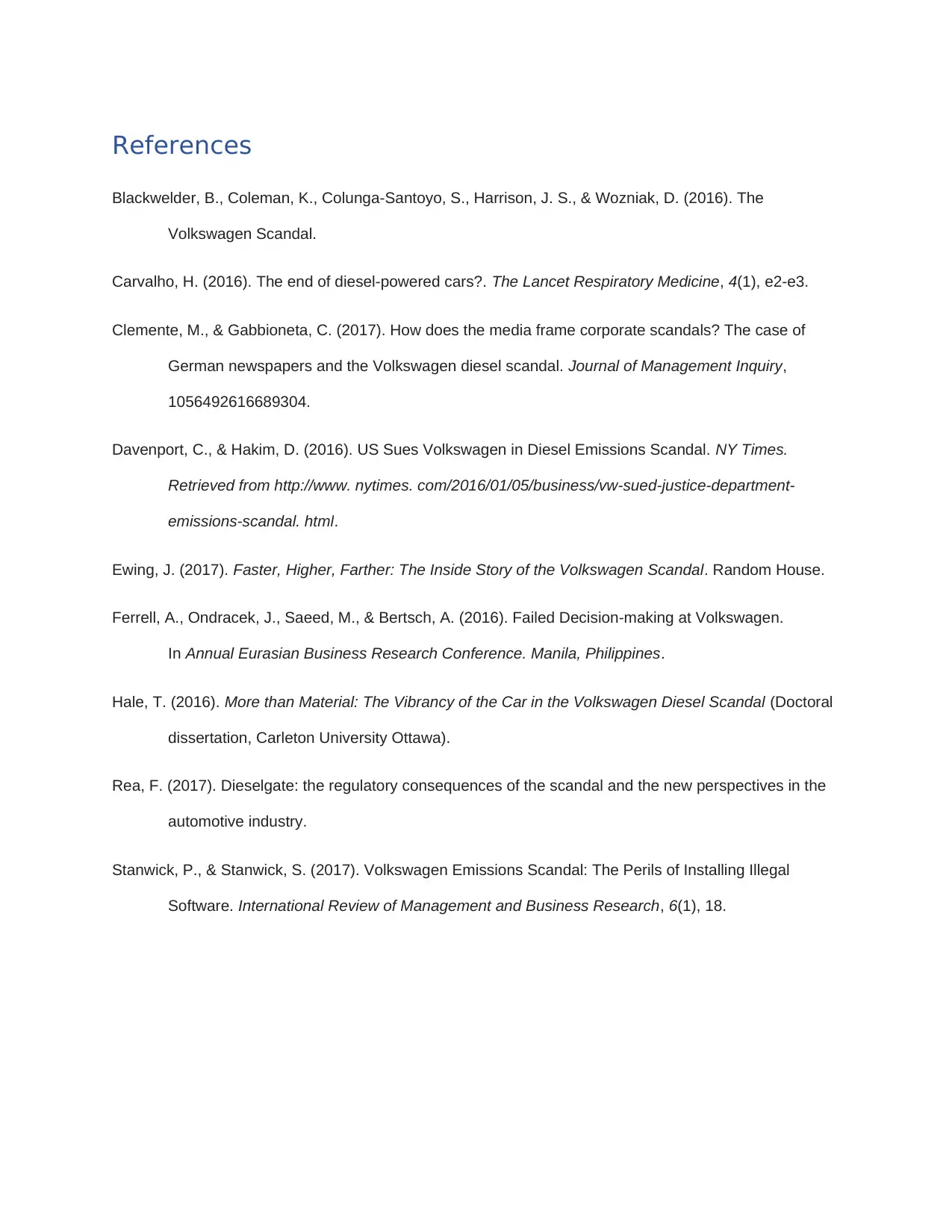
References
Blackwelder, B., Coleman, K., Colunga-Santoyo, S., Harrison, J. S., & Wozniak, D. (2016). The
Volkswagen Scandal.
Carvalho, H. (2016). The end of diesel-powered cars?. The Lancet Respiratory Medicine, 4(1), e2-e3.
Clemente, M., & Gabbioneta, C. (2017). How does the media frame corporate scandals? The case of
German newspapers and the Volkswagen diesel scandal. Journal of Management Inquiry,
1056492616689304.
Davenport, C., & Hakim, D. (2016). US Sues Volkswagen in Diesel Emissions Scandal. NY Times.
Retrieved from http://www. nytimes. com/2016/01/05/business/vw-sued-justice-department-
emissions-scandal. html.
Ewing, J. (2017). Faster, Higher, Farther: The Inside Story of the Volkswagen Scandal. Random House.
Ferrell, A., Ondracek, J., Saeed, M., & Bertsch, A. (2016). Failed Decision-making at Volkswagen.
In Annual Eurasian Business Research Conference. Manila, Philippines.
Hale, T. (2016). More than Material: The Vibrancy of the Car in the Volkswagen Diesel Scandal (Doctoral
dissertation, Carleton University Ottawa).
Rea, F. (2017). Dieselgate: the regulatory consequences of the scandal and the new perspectives in the
automotive industry.
Stanwick, P., & Stanwick, S. (2017). Volkswagen Emissions Scandal: The Perils of Installing Illegal
Software. International Review of Management and Business Research, 6(1), 18.
Blackwelder, B., Coleman, K., Colunga-Santoyo, S., Harrison, J. S., & Wozniak, D. (2016). The
Volkswagen Scandal.
Carvalho, H. (2016). The end of diesel-powered cars?. The Lancet Respiratory Medicine, 4(1), e2-e3.
Clemente, M., & Gabbioneta, C. (2017). How does the media frame corporate scandals? The case of
German newspapers and the Volkswagen diesel scandal. Journal of Management Inquiry,
1056492616689304.
Davenport, C., & Hakim, D. (2016). US Sues Volkswagen in Diesel Emissions Scandal. NY Times.
Retrieved from http://www. nytimes. com/2016/01/05/business/vw-sued-justice-department-
emissions-scandal. html.
Ewing, J. (2017). Faster, Higher, Farther: The Inside Story of the Volkswagen Scandal. Random House.
Ferrell, A., Ondracek, J., Saeed, M., & Bertsch, A. (2016). Failed Decision-making at Volkswagen.
In Annual Eurasian Business Research Conference. Manila, Philippines.
Hale, T. (2016). More than Material: The Vibrancy of the Car in the Volkswagen Diesel Scandal (Doctoral
dissertation, Carleton University Ottawa).
Rea, F. (2017). Dieselgate: the regulatory consequences of the scandal and the new perspectives in the
automotive industry.
Stanwick, P., & Stanwick, S. (2017). Volkswagen Emissions Scandal: The Perils of Installing Illegal
Software. International Review of Management and Business Research, 6(1), 18.
1 out of 7
Related Documents
Your All-in-One AI-Powered Toolkit for Academic Success.
+13062052269
info@desklib.com
Available 24*7 on WhatsApp / Email
![[object Object]](/_next/static/media/star-bottom.7253800d.svg)
Unlock your academic potential
Copyright © 2020–2026 A2Z Services. All Rights Reserved. Developed and managed by ZUCOL.




